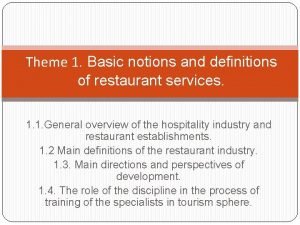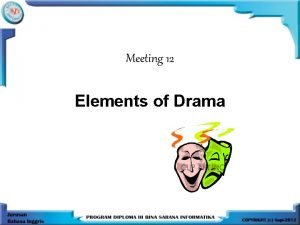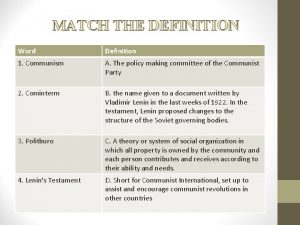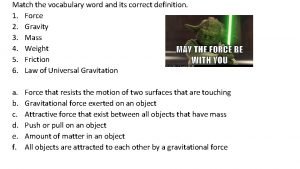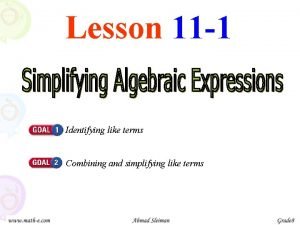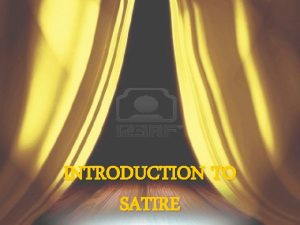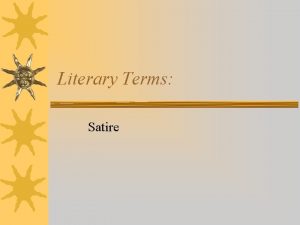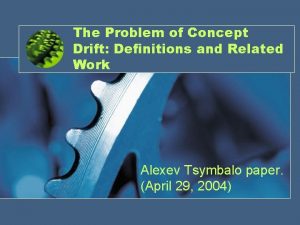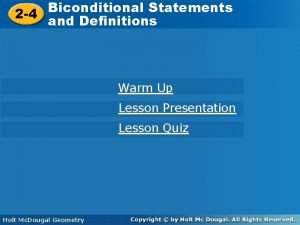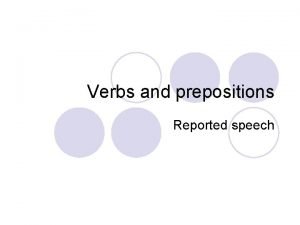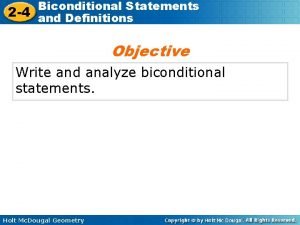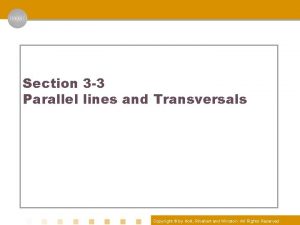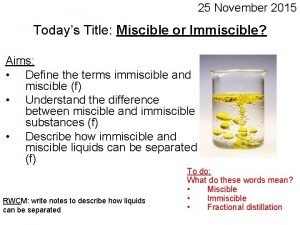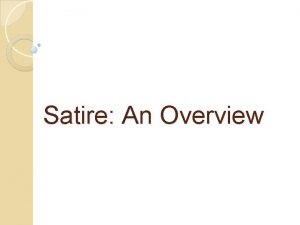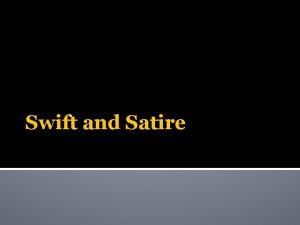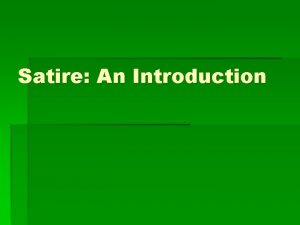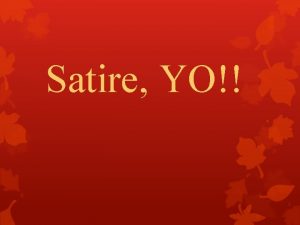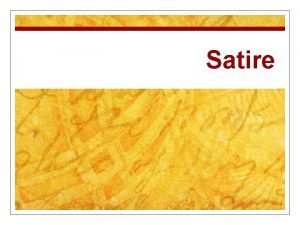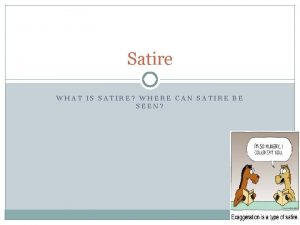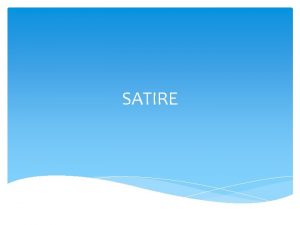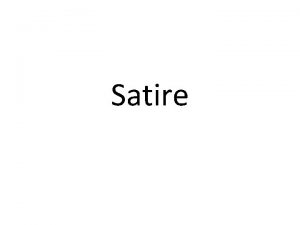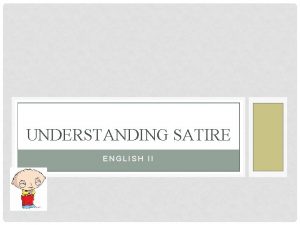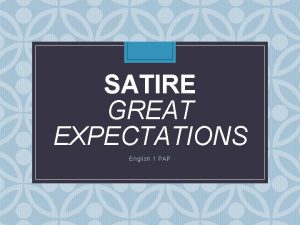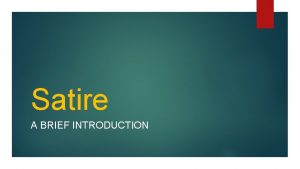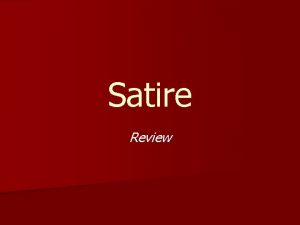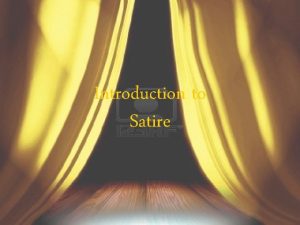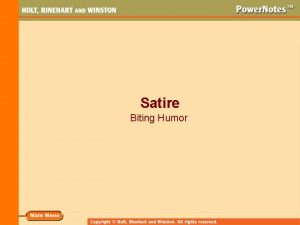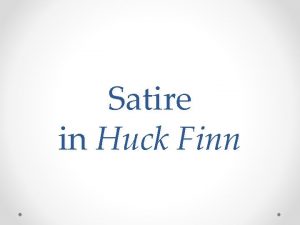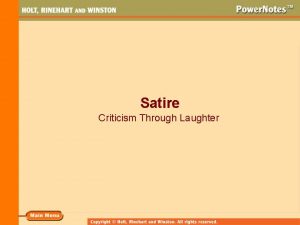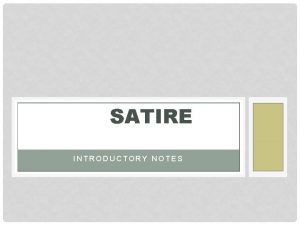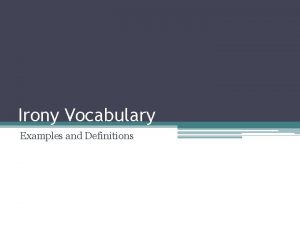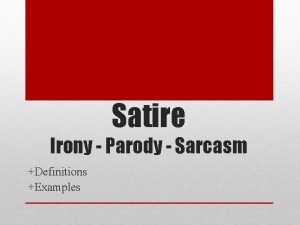SATIRE DEFINITIONS AND TERMS Satire Satire is a

































- Slides: 33


SATIRE

DEFINITIONS AND TERMS

Satire ¦Satire is a literary genre that uses irony, wit, and sometimes sarcasm to expose humanity’s vices and foibles, giving impetus, or momentum, to change or reform through ridicule. ¦It is a manner of writing that mixes a critical attitude with wit and humor in an effort to improve mankind and human institutions.

Satire ¦While some writers and commentators use a serious tone to persuade their audiences to accept their perspective on various issues, some writers specifically use humor to convey a serious message.

Satire • A writer may point a satire toward a person, a country or even the entire world. Usually, a satire is a comical piece of writing which makes fun of an individual or a society to expose its stupidity and shortcomings. In addition, he hopes that those he criticizes will improve their characters by overcoming their weaknesses.


The Function of Satire • The role of satire is to ridicule or criticize those vices in the society, which the writer considers a threat to civilization. The writer considers it his obligation to expose these vices for the betterment of humanity.



Types of Direct Satire ¦Horatian satire is a type of direct satire which pokes fun at human foibles with a witty even indulgent tone. ¦Juvenalian satire is a type of direct satire which denounces, sometimes with invective, human vice and error in dignified and solemn tones.

Horatian Satire ¦This type of satire is named after the Roman satirist Horatian. ¦It seeks to criticize, rather than attack, immorality or stupidity. ¦In general, Horatian satire is gentler, more sympathetic, and more tolerant of human folly. ¦Unlike Juvenalian satire, it serves to make us laugh at human folly as opposed to holding our failures up for needling. ¦Horatian persons. ¦It satire tends to ridicule human folly in general or by type rather than attack specific tends to produce a smile.

Juvenalian Satire ¦This ¦It type of satire is named after the Roman satirist Juvenal. is harsher than Horatian satire because it often attacks and shows contempt for people. ¦Often, it seeks to address some evil in society through scorn and ridicule. ¦The Juvenalian satirist approaches his work in a more serious manner and uses dignified language to attack erroneous thinking or vice. ¦In this way Juvenalian satire evokes feelings of scorn, shock, and righteous indignation in the mind of the reader.

Juvenalian Satire

¦The Characteristics of Satiric Writing following slides describe the various characteristics that often appear in satiric writing: v Irony v Hyperbole v Caricature v Wit v Sarcasm v Ridicule v Parody v Invective • As you read the literature in the remainder of this unit, your goal will be to identify and analyze these characteristics and their effect on the various texts.

Irony ¦Irony is a mode of expression, through words (verbal irony) or events (irony of situation), conveying a reality different from and usually opposite to appearance or expectation. ¦The surprise recognition by the audience often produces a comic effect, making irony often funny. ¦When a text intended to be ironic does not seen as such, the effect can be disastrous. ¦To be an effective piece of sustained irony, there must be some sort of audience tip -off, through style, tone, use of clear exaggeration, or other device.

Irony

Hyperbole ¦Hyperbole is deliberate exaggeration to achieve an effect; overstatement.

Caricature ¦A caricature is an exaggeration or other distortion of an individual's prominent features or characteristics to the point of making that individual appear ridiculous. ¦The term is applied more often to graphic representations than to literary ones. ¦Stereotyping is often grouped with caricature.

Caricature

Wit ¦Wit is most commonly understood as clever expression, whether aggressive or harmless; that is, with or without derogatory intent toward someone or something in particular. ¦We also tend to think of wit as being characterized by a mocking or paradoxical quality, evoking laughter through apt phrasing. ¦Use of wit can be expressed as a pun.

Wit

Sarcasm ¦Sarcasm is intentional derision, generally directed at another person and intended to hurt. term comes from a Greek word meaning “to tear flesh like dogs” and signifies a cutting remark. ¦The ¦Sarcasm usually involves obvious, verbal irony, achieving its effect by jeeringly stating the opposite of what is meant so as to heighten the insult.

Sarcasm

Ridicule ¦Ridicule is the use of words intended to belittle a person or idea and arouse contemptuous laughter. ¦The goal is to condemn or criticize by making the thing, idea, or person seem laughable and ridiculous.

Ridicule

Parody ¦A parody is an imitation of an author or his/her work with the idea of ridiculing the author, his/her ideas, or the work itself. ¦A parodist exploits the peculiarities of an author’s expression—the propensity to use too many parentheses, certain favorite words, or other elements of the author’s style.

Parody ¦“Amish Paradise” Weird Al Yankovic

Parody

• SNL: Justin Timberlake-Beyonce

Invective ¦Invective is speech or writing that abuses, denounces, or attacks. It can be directed against a person, cause, idea, or system. ¦It employs a heavy use of negative emotive language. ¦For Example: “I cannot but conclude the bulk of your natives to be the most pernicious race of little odious vermin that nature ever suffered to crawl upon the surface of the earth. ” (Swift, Gulliver’s Travels)

Invective

Reduction ad Absurdum ¦Reductio ad absurdum is a popular satiric technique whereby the author agrees enthusiastically with the basic attitudes or assumptions he wishes to satirize and, by pushing them to a logically ridiculous extreme, exposes the foolishness of the original attitudes and assumptions ¦Reductios are sometimes dangerous either because the reader does not recognize the satire at work or because the reader fails to identify the target clearly. ¦For example: Toshiba impact-smart hard drive commercials
 Striker welding definition
Striker welding definition Cheek cut rafter
Cheek cut rafter A point has:
A point has: Restaurant terms and definitions
Restaurant terms and definitions Undefined terms and basic definitions worksheet answers
Undefined terms and basic definitions worksheet answers Pharmacopollaxy
Pharmacopollaxy Match the following
Match the following Elements of drama diagram
Elements of drama diagram Match the vocabulary word with its meaning. 1. communism
Match the vocabulary word with its meaning. 1. communism Match the words with the correct definitions
Match the words with the correct definitions Match the word to the correct definition
Match the word to the correct definition Match each latin phrase to the correct definition.
Match each latin phrase to the correct definition. Polynomial degrees and terms
Polynomial degrees and terms What are like terms
What are like terms Verbal irony in shrek
Verbal irony in shrek Literary terms satire
Literary terms satire Verbal irony in julius caesar
Verbal irony in julius caesar The problem of concept drift: definitions and related work
The problem of concept drift: definitions and related work Material properties definitions
Material properties definitions Vocabulary for hatchet
Vocabulary for hatchet 8 news values
8 news values Compare/contrast definition
Compare/contrast definition Cscmp definition of supply chain management
Cscmp definition of supply chain management It is the vertical & long flute of the b'laan
It is the vertical & long flute of the b'laan Film genres and definitions
Film genres and definitions Conceptualization operationalization and measurement
Conceptualization operationalization and measurement Biconditional statement
Biconditional statement Welding positions
Welding positions Reported speech prepositions
Reported speech prepositions Examples of reciprocal determinism
Examples of reciprocal determinism Chapter 28 monomer liquid and polymer powder
Chapter 28 monomer liquid and polymer powder 2-4 biconditional statements and definitions
2-4 biconditional statements and definitions Parallel lines and transversals definitions
Parallel lines and transversals definitions Miscible liquids
Miscible liquids



